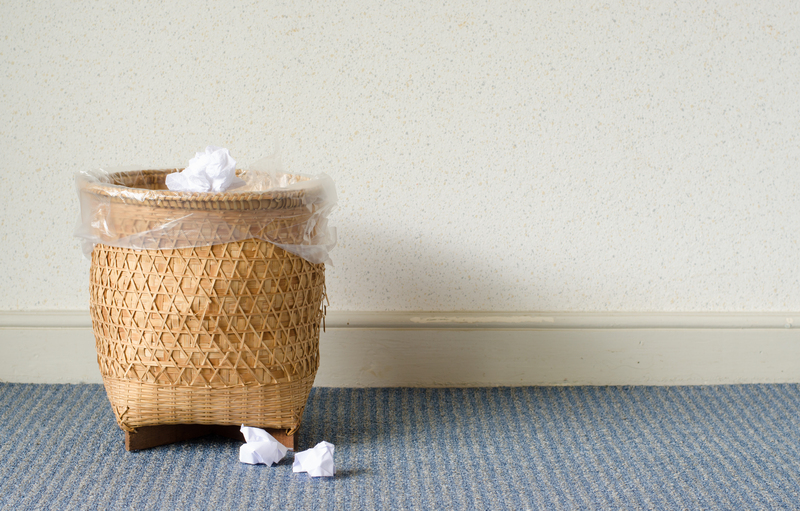Tactical Steps for Reducing Everyday Home Waste: A Comprehensive Guide
Did you know the average person produces nearly 5 pounds of waste per day in the U.S.? Tackling this challenge begins at home, where waste reduction becomes both a personal responsibility and an opportunity for positive environmental impact. In this guide, we'll explore effective, actionable, and tactical steps for reducing everyday home waste, empowering you to create a cleaner, greener household.
Why Minimizing Household Waste Matters
Reducing household waste is crucial for minimizing landfill overflow, conserving natural resources, cutting greenhouse gas emissions, and promoting a healthier community environment. By implementing practical waste-reduction strategies, every household can optimize resource usage and promote sustainability.
- Environmental Impact: Excess garbage leads to pollution and harms wildlife.
- Economic Savings: Reducing waste often means spending less on disposable products.
- Personal Satisfaction: Living waste-consciously brings a sense of responsibility and accomplishment.

1. Analyze Your Current Waste Patterns
Before adopting waste reduction strategies, it's crucial to understand what you throw away. Undertake a home waste audit for a week:
- Keep track of each bag of trash
- Sort by categories: food, plastics, paper, glass, etc.
- Identify items most frequently discarded
An honest assessment will spotlight your biggest areas for improvement and guide your tactical approach to minimizing everyday waste.
2. Embrace the 5 Rs: Refuse, Reduce, Reuse, Repurpose, Recycle
Refuse
- Say no to free promotional items, unnecessary receipts, and single-use plastics.
- Politely decline disposable bags, straws, and packaging wherever possible.
Reduce
- Purchase only what you truly need--avoid impulse shopping.
- Buy in bulk to minimize packaging waste.
- Choose quality, durable items over cheap, disposable alternatives.
Reuse
- Opt for products designed for multiple uses, such as reusable water bottles, bags, and containers.
- Repurpose containers, jars, and packaging for storage or organization.
Repurpose
- Get creative! Turn old clothes into cleaning rags, jars into planters, or broken furniture into new projects.
- Engage in DIY upcycling activities--numerous tutorials are available online.
Recycle
- Separate recyclables (paper, cardboard, glass, plastics, aluminum) properly.
- Research your local recycling program guidelines and follow them closely to avoid contamination.
3. Curb Kitchen Waste: Food Storage, Planning, and Composting
Strategic Meal Planning
Planning meals in advance not only saves money but also drastically cuts down on food wastage. Here's how:
- Write shopping lists based on planned meals for the week.
- Rotate perishable food (use the "first in, first out" method).
- Embrace leftovers, transforming them into new dishes.
Proper Food Storage
- Store fruits, vegetables, dairy, and meats appropriately to extend freshness.
- Invest in glass or metal containers for storing food instead of single-use plastics.
Start Composting At Home
- Composting organic matter like vegetable peels, eggshells, and coffee grounds reduces landfill waste and creates natural fertilizer.
- Choose between backyard compost bins or compact indoor composters for smaller spaces.
Practical composting turns kitchen waste into rich soil, fostering a circular waste system in your own home!
4. Rethink Bathroom and Personal Care Waste
Switch to Reusables
- Choose washable cloths over paper towels and single-use wipes.
- Use refillable soap dispensers and bamboo toothbrushes for a greener routine.
- Opt for bar soaps and shampoo bars--these usually require less packaging compared to liquid alternatives.
Mindful Purchases
- Seek out products with recyclable or compostable packaging.
- Buy in bulk to minimize single-use packaging waste--store excess in reusable containers.
Repurpose Containers
- Empty cosmetic or pill containers can be used for craft storage or travel-sized toiletries.
5. Eco-Conscious Cleaning: Greener Ways to a Clean Home
Switch to Concentrates and Refills
- Purchase cleaning products in concentrated forms and dilute them at home, reducing packaging waste.
- Buy refills rather than new bottles--some stores offer refill stations for detergents and soaps.
DIY Cleaning Solutions
- Make your own cleaning products with simple, non-toxic ingredients like vinegar, baking soda, and lemon.
- Reuse spray bottles for homemade cleaners.
Eco-friendly cleaning steps not only cut back on landfill waste but also protect indoor air quality and household health.
6. Smart Shopping: Mindful Consumer Choices
Go Package-Free Whenever Possible
- Shop at bulk stores or farmers' markets that encourage bringing your own containers and bags.
- Choose loose produce instead of pre-packaged fruits and vegetables.
Support Sustainable Brands
- Select brands actively reducing packaging waste, offering take-back schemes, or using recycled materials.
Digital Over Paper
- Opt for digital receipts, bills, and subscriptions instead of paper versions to significantly reduce paper waste at home.
7. Declutter Responsibly
Donate, Sell, Freecycle
- Pass on unwanted clothes, electronics, and household goods via donation centers or online marketplaces.
- Join local freecycle groups to give items a new life and divert them from the trash.
Recycle Electronics Properly
- Take old electronics to certified e-waste recycling centers.
8. Waste Reduction for Families: Get Everyone Involved
Lead by Example
- Encourage children to participate in recycling, composting, and upcycling projects.
Reward and Motivate
- Set up waste-reduction challenges or incentives within the household--make it fun!
Educational Activities
- Read books and watch documentaries together to build a culture of sustainability at home.
9. Upgrade Your Waste Bins and Systems
- Set up separate, clearly labeled bins for landfill, recycling, and compost.
- Place bins in accessible spots to ensure everyone participates effortlessly.
- Review your city's waste collection guidelines regularly to stay updated.
10. Stay Inspired: Keep Learning and Adapting
- Keep abreast of new waste-reduction resources, community workshops, and local zero-waste initiatives.
- Connect with eco-friendly groups online or in your area for new ideas and accountability.
- Share your progress with friends and family -- inspire others by example!

Bonus Tips: Easy Swaps to Slash Home Waste
- Switch to rechargeable batteries for electronics.
- Use cloth napkins and towels instead of paper alternatives.
- Invest in a soda maker to avoid buying single-use bottles and cans.
- Plant a small herb or vegetable garden to reduce packaging and food miles.
- Request minimal packaging when shopping online.
Conclusion: The Power of Tactical Everyday Waste Reduction
Building a sustainable household is an ongoing journey, but every small tactical step towards reducing daily home waste adds up to a remarkable impact. Analyze your habits, involve your family, choose reusables, and celebrate progress. With ongoing commitment, your home can become a beacon of environmental responsibility and sustainable living. Start today--because the planet, and future generations, depend on the changes we make now.
Ready to take these tactical steps for reducing everyday home waste? Make small changes, stay informed, and watch as your household transforms for the better--one day, and one item, at a time.